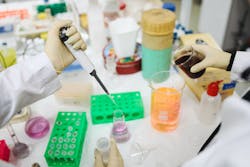The U.S. Food and Drug Administration (FDA) revised its policy on COVID-19 serology tests, and now requires commercial developers to apply for an emergency use authorization (EUA) for their tests.
Commercial developers have 10 business days from the date they notify the FDA that they have completed their validation testing on an antibody assay and are marketing the product. For tests already on the market, developers must submit the EUA application within 10 business days of May 4.
Under the original policy, posted March 16, the FDA allowed commercial developers to market their tests after completing internal validation studies.
The FDA said 12 antibody tests have been authorized under an individual EUA, while over 200 other antibody tests are the subject of a pre-EUA or EUA review.
Under the new policy, high-complexity laboratories that develop their own tests, called laboratory developed tests or LDTs, are not required to seek an EUA, although the FDA encourages them to do so. The labs must have a CLIA certificate, validate the tests, provide notice to the FDA about their intention to use the tests and follow the FDA’s labeling recommendations.
The serology tests detect immunoglobulin M (IgM) and immunoglobulin G (IgG)—the antibodies the body produces to fight off SARS-CoV-2, the virus that causes COVID-19 disease.
In explaining the agency’s decision to revise its policy, two FDA officials wrote on the agency’s website, “We unfortunately see unscrupulous actors marketing fraudulent test kits and using the pandemic as an opportunity to take advantage of Americans’ anxiety. Some test developers have falsely claimed their serological tests are FDA approved or authorized. Others have falsely claimed that their tests can diagnose COVID-19 or that they are for at-home testing,” they wrote.
Anand Shah, MD, Deputy FDA Commissioner for Medical and Scientific Affairs, and Jeff Shuren, MD, Director of the FDA Center for Devices and Radiological Health, also noted that some of the commercially available serology tests have “performed poorly” on evaluations conducted by the National Institutes of Health (NIH).
The FDA worked with the NIH, the Centers for Disease Controls and Prevention, and the Biomedical Advanced Research and Development Authority (BARDA) to develop the capability to validate the antibody tests at the National Cancer Institute (NCI). The idea is to use NCI data to guide FDA officials when they are evaluating EUA applications.
If tests perform poorly on the NCI evaluations, the FDA can ask test developers to submit additional information or it can stop the developers from marketing the tests in the United States, the agency said.

